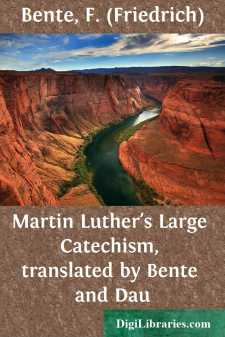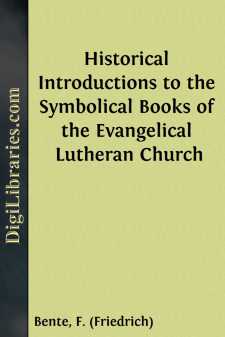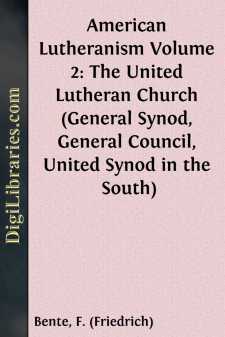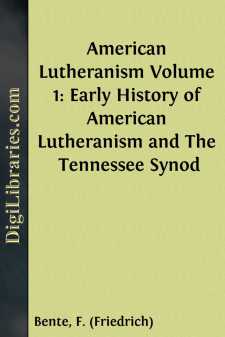Categories
- Antiques & Collectibles 13
- Architecture 36
- Art 48
- Bibles 22
- Biography & Autobiography 813
- Body, Mind & Spirit 142
- Business & Economics 28
- Children's Books 17
- Children's Fiction 14
- Computers 4
- Cooking 94
- Crafts & Hobbies 4
- Drama 346
- Education 46
- Family & Relationships 57
- Fiction 11829
- Games 19
- Gardening 17
- Health & Fitness 34
- History 1377
- House & Home 1
- Humor 147
- Juvenile Fiction 1873
- Juvenile Nonfiction 202
- Language Arts & Disciplines 88
- Law 16
- Literary Collections 686
- Literary Criticism 179
- Mathematics 13
- Medical 41
- Music 40
- Nature 179
- Non-Classifiable 1768
- Performing Arts 7
- Periodicals 1453
- Philosophy 64
- Photography 2
- Poetry 896
- Political Science 203
- Psychology 42
- Reference 154
- Religion 513
- Science 126
- Self-Help 84
- Social Science 81
- Sports & Recreation 34
- Study Aids 3
- Technology & Engineering 59
- Transportation 23
- Travel 463
- True Crime 29
F. (Friedrich) Bente
Friedrich Bente (1858–1930) was a Lutheran pastor and theologian known for his historical and doctrinal contributions to the Lutheran Church–Missouri Synod. He is most famous for his work on the "Concordia Triglotta," a critical edition of Lutheran confessional documents in three languages. Bente also authored "Historical Introductions to the Book of Concord," which provides valuable context and background on key Lutheran texts. His writings remain influential in Lutheran circles, particularly in the study of confessional history and theology.
Author's Books:
Sort by:
The Sixth Petition. And lead us not into temptation. We have now heard enough what toil and labor is required to retain all that for which we pray, and to persevere therein, which, however, is not achieved without infirmities and stumbling. Besides, although we have received forgiveness and a good conscience and are entirely acquitted, yet is our life of such a nature that one stands to-day and...
more...
Book of Concord, or Concordia, is the title of the Lutheran corpus doctrinae, i.e., of the symbols recognized and published under that name by the Lutheran Church. The word symbol, sumbolon, is derived from the verb sumballein, to compare two things for the purpose of perceiving their relation and association. Sumbolon thus developed the meaning of tessara, or sign, token, badge, banner, watchword,...
more...
MERGER. 1. Origin of the New Body.—On April 18, 1917, at Philadelphia, the Joint Quadricentennial Committee, appointed by the General Synod, the General Council, and the United Synod in the South to arrange for a union celebration of the Reformation, decided that the merging of the three affiliated general bodies would be "the fittest commemoration and noblest memorial of the four-hundredth...
more...
AMERICAN LUTHERANISM Volume I Early History of American Lutheranism and The Tennessee Synod By F. BENTE St. Louis, Mo. CONCORDIA PUBLISHING HOUSE 1919 PREFACE. Essentially, Christianity is the special divine faith in the truth revealed by the Bible that we are saved, not by our own efforts, works, or merits, but alone by the pure and unmerited grace of God, secured by Christ Jesus and freely offered in...
more...





